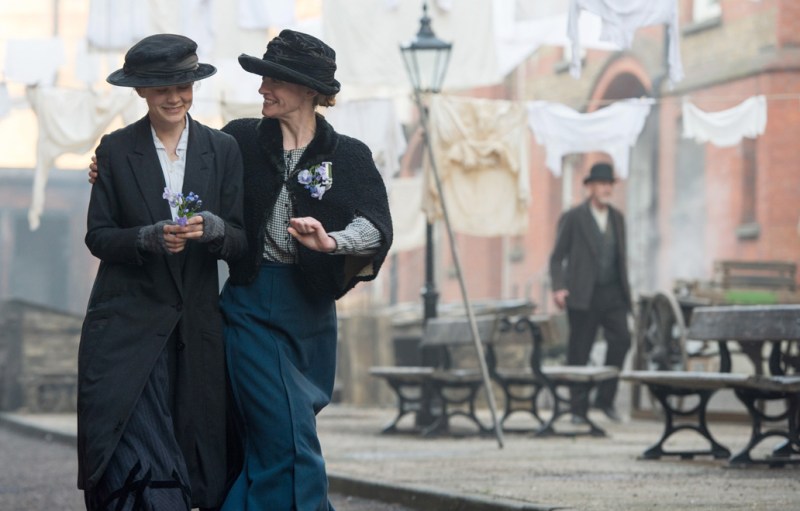The latest project from Sarah Gavron and Abi Morgan is garnering well-deserved attention on both sides of the pond. “Suffragette” is an emotional tribute to the decades-long effort by British women to gain the right to vote. Compressing the struggle into less than two hours is a lofty goal, and the script by Abi Morgan (“Iron Lady”) focuses on the transformation of one individual, Maud Watts (Carey Mulligan).
Set amid the gray streets of London, and grounded by standout performances from Carey Mulligan and Helena Bonham Carter, “Suffragette” is a microcosmic analysis of the movement. This approach has flaws, lending itself to some contrived scenes and character arcs, but it is also the film’s greatest strength.
Maud initially has little interest in the increasingly violent suffragette movement, keeping a low profile at the textile factory where she works in an effort to avoid her sexually abusive overseer. When a headstrong colleague begins to invite her to meetings, however, she tentatively attends despite her husband’s disapproval.
At times, Maud’s transformation feels artificial, as when she is dramatically forced into testifying for David Lloyd George about her experience as a working-class woman. The personal transition from passive wife to militant suffragette is grand, and following this arc results in some very predictable moments of personal reform for Maud. She fights with her husband, participates in her first acts of violence and eventually embraces her role as a suffragette, none of which makes for surprising cinema.
In addition, the conflict between men and women throughout the film also seems exaggerated. In one particularly melodramatic scene, Maud’s husband gives their son away for adoption. Men are consistently monstrous, cold and abusive, with the lone exception being fellow suffragette Edith Ellyn’s (Helena Bonham Carter) supportive husband.
The stark contrast between men and women makes a deserved point, but sacrifices a degree of realism. It feels too obvious, making explicit through dialogue a power dynamic that should be implied. Only when men have taken everything from Maud does she fully commit to the violence inherent in the suffragette cause – the problematic implication being that she couldn’t have or wouldn’t have committed otherwise.
Looking beyond these flaws, the storyline as a whole is compelling. In the traditional historical narrative, leaders like Emmeline Pankhurst (Meryl Streep) are credited for many of the suffragette movement’s advances. “Suffragette” counters this view, and argues that it is ultimately individuals like Maud and Edith Ellyn who were ultimately responsible for bringing about monumental voting reform. This take on history allows Carey Mulligan to deliver a gripping performance, and it is through this unconventional approach to the narrative that “Suffragette” finds its voice.
Importantly, “Suffragette” reinforces that the fight for equality is not yet over. This launches a timely discussion of sexism and inequality in the 21st century that should continue long after the film is released. “Suffragette” can certainly inform your contribution to that conversation, but you may also enjoy it simply for its dynamic telling of an important historical chapter.
Contact Reed Canaan at rcanaan ‘at’ stanford.edu.
